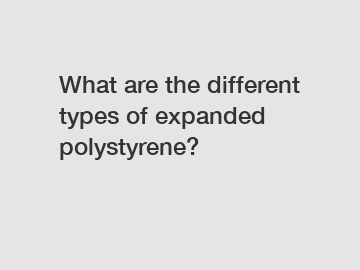Feb. 18, 2024
Agriculture
Expanded polystyrene (EPS) is a versatile material that is used in a wide range of applications due to its excellent insulation properties and lightweight nature. EPS is made by expanding polystyrene beads with steam and then molding them into various shapes and sizes. There are different types of EPS available, each designed for specific uses based on their properties and characteristics. In this article, we will explore the various types of expanded polystyrene.
Types of Expanded Polystyrene.
Raw EPS Beads:

Raw EPS beads are the most basic form of expanded polystyrene. These beads are often used in construction applications where they can be mixed with cement to create lightweight concrete with excellent insulation properties. Raw EPS beads are also used in packaging to cushion fragile items during shipping.
EPS Sheets:
EPS sheets are flat panels of expanded polystyrene that are commonly used in insulation applications. These sheets are lightweight, easy to install, and offer excellent thermal insulation properties. EPS sheets are commonly used in the construction of walls, roofs, and floors to help regulate indoor temperatures and reduce energy costs.
EPS Blocks:
EPS blocks are large pieces of expanded polystyrene that are used in a variety of applications. These blocks are often used in packaging to create custom protective inserts for shipping delicate items. EPS blocks are also used in construction for insulation, as well as in artistic and craft projects for creating sculptures and props.
EPS Molding:
EPS can be molded into nearly any shape or size, making it a versatile material for a wide range of applications. EPS molding is commonly used in the packaging industry to create custom packaging solutions for fragile and oddly shaped items. EPS molding can also be used in construction for creating decorative architectural elements such as cornices and columns.
Specialty EPS Products:
In addition to the standard forms of expanded polystyrene, there are also specialty EPS products available for specific applications. For example, flame-retardant EPS is designed for use in buildings where fire safety is a concern. Self-adhesive EPS features a sticky backing that makes it easy to install in walls and ceilings. Recycled EPS is made from recycled materials, making it a more environmentally friendly option.
High-Density EPS:
High-density EPS is a type of expanded polystyrene that offers increased strength and durability compared to standard EPS. This makes it ideal for applications where additional support is needed, such as in road construction or landscaping. High-density EPS is also used in the production of surfboards and other recreational equipment where lightweight, durable materials are essential.
Conclusion.
Expanded polystyrene is a versatile material with a wide range of applications. From basic raw EPS beads to specialty products like flame-retardant EPS and high-density EPS, there are many types of expanded polystyrene available to suit specific needs. Whether you are looking for insulation for your home, protective packaging for shipping, or custom architectural elements for a building project, there is an EPS product that is right for you.
If you have any questions about the different types of expanded polystyrene or need help selecting the right product for your specific application, please feel free to contact us.
For more Lost foam casting production line, EPS Shape Molding Machines, What is the difference between lost foam casting and solid castinginformation, please contact us. We will provide professional answers.
If you are interested in sending in a Guest Blogger Submission,welcome to write for us!
All Comments ( 0 )